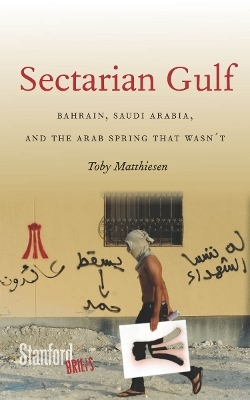
Sectarian Gulf
Bahrain, Saudi Arabia, and the Arab Spring That Wasn't
Seiten
2013
Stanford University Press (Verlag)
978-0-8047-8573-0 (ISBN)
Stanford University Press (Verlag)
978-0-8047-8573-0 (ISBN)
This books shows that mass protests erupted in the Gulf states in the wake of the Arab Spring and explains how Gulf regimes survived by dividing protesters along sectarian lines.
As popular uprisings spread across the Middle East, popular wisdom often held that the Gulf States would remain beyond the fray. In Sectarian Gulf, Toby Matthiesen paints a very different picture, offering the first assessment of the Arab Spring across the region. With first-hand accounts of events in Bahrain, Saudi Arabia, and Kuwait, Matthiesen tells the story of the early protests, and illuminates how the regimes quickly suppressed these movements.
Pitting citizen against citizen, the regimes have warned of an increasing threat from the Shia population. Relations between the Gulf regimes and their Shia citizens have soured to levels as bad as 1979, following the Iranian revolution. Since the crackdown on protesters in Bahrain in mid-March 2011, the "Shia threat" has again become the catchall answer to demands for democratic reform and accountability. While this strategy has ensured regime survival in the short term, Matthiesen warns of the dire consequences this will have—for the social fabric of the Gulf States, for the rise of transnational Islamist networks, and for the future of the Middle East.
As popular uprisings spread across the Middle East, popular wisdom often held that the Gulf States would remain beyond the fray. In Sectarian Gulf, Toby Matthiesen paints a very different picture, offering the first assessment of the Arab Spring across the region. With first-hand accounts of events in Bahrain, Saudi Arabia, and Kuwait, Matthiesen tells the story of the early protests, and illuminates how the regimes quickly suppressed these movements.
Pitting citizen against citizen, the regimes have warned of an increasing threat from the Shia population. Relations between the Gulf regimes and their Shia citizens have soured to levels as bad as 1979, following the Iranian revolution. Since the crackdown on protesters in Bahrain in mid-March 2011, the "Shia threat" has again become the catchall answer to demands for democratic reform and accountability. While this strategy has ensured regime survival in the short term, Matthiesen warns of the dire consequences this will have—for the social fabric of the Gulf States, for the rise of transnational Islamist networks, and for the future of the Middle East.
Toby Matthiesen is a Research Fellow in Islamic and Middle Eastern Studies at Pembroke College, University of Cambridge. He has published in The New York Review of Books, The Guardian, Foreign Policy, Middle East Journal, and Middle East Report, and has done extensive fieldwork in the Middle East during the Arab Spring. He previously worked as a Gulf Consultant for the International Crisis Group.
| Erscheint lt. Verlag | 3.7.2013 |
|---|---|
| Verlagsort | Palo Alto |
| Sprache | englisch |
| Maße | 127 x 203 mm |
| Gewicht | 181 g |
| Themenwelt | Sozialwissenschaften ► Politik / Verwaltung ► Europäische / Internationale Politik |
| ISBN-10 | 0-8047-8573-2 / 0804785732 |
| ISBN-13 | 978-0-8047-8573-0 / 9780804785730 |
| Zustand | Neuware |
| Haben Sie eine Frage zum Produkt? |
Mehr entdecken
aus dem Bereich
aus dem Bereich
Studienbuch
Buch | Hardcover (2023)
De Gruyter Oldenbourg (Verlag)
CHF 62,90
erfolgreiche Interessenvertretung durch Prozesskompetenz im komplexen …
Buch | Hardcover (2023)
Wiley-VCH (Verlag)
CHF 58,75


